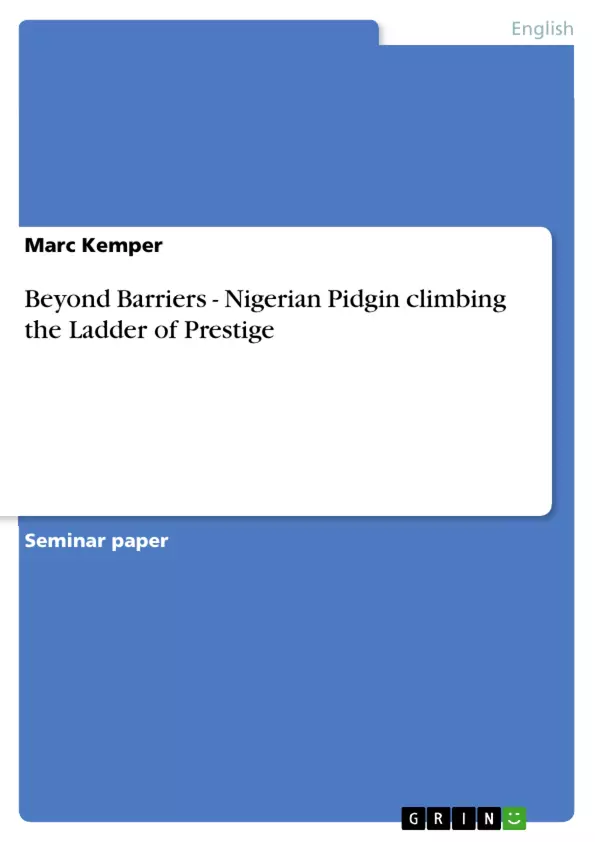In times of the pre-colonial period, contact between English and Nigerian indigenous languages was hardly to recognize. West Africa came into contact with Europeans for the first time in the 15th century. The Britons were – in contrast to the Spanish and Portuguese - latecomers to the African scene, which is why the Nigerian languages did not have been influenced by the English language until the beginning of the colonial period. The unification of Nigeria in 1914 marked the starting point of her colonization. Since that point in time, contact between English and the major Nigerian languages has been increasing. Nigerian Pidgin (NP), which developed as a contact language between English and various indigenous languages, nowadays does no more fit the definition of a Pidgin as a pure contact language, for it is mainly spoken locally and not throughout the whole country. It is neither a creole, because it is not learned natively by children – at least not throughout its whole area of spreading.
To give an overview on how English, Nigerian Pidgin, and the three major indigenous languages are currently fighting to gain ground over each other in multilingual Nigeria, is the topic of this paper’s first chapter. The role of English in West Africa in general and Nigeria in particular has been examined to a larger extent in the seminar, so here the main focus is laid on NP and the other three major indigenous languages. The second part deals with the altering role of Nigerian Pidgin in terms of literature, interethnic communication, and the mass media. Regarding NP on its way to a wider spread, nowadays it already is a foregone conclusion that this way would be paved with sharp stones – those mostly put down by the administrative and governing institutions in Nigeria. This is why the last large section of this paper concentrates on prospective problems which NP – and the other major languages spoken in Nigeria - will have to cope with in the next decades. To conclude, I am shortly touching on the thoughts and questions which came to my mind while investigating, and writing this paper.
Inhaltsverzeichnis (Table of Contents)
- Introduction
- Aspects of the Current Linguistic Situation
- English and Nigerian Pidgin
- The wide Spectre of Indigenous Languages
- Hausa
- Igbo
- Yoruba
- Sharing a Concept of the Enemy
- A Change of Mind
- NP and the Need for Interethnic Communication
- NP and Literature
- NP on Screens and the Radio
- Prospective Future Problems
- Limitations of a further spread of Nigerian Pidgin
- Language Endangerment
- Conclusion
Zielsetzung und Themenschwerpunkte (Objectives and Key Themes)
This paper investigates the evolving linguistic landscape of Nigeria, focusing on the interplay between English, Nigerian Pidgin (NP), and major indigenous languages like Hausa, Igbo, and Yoruba. The main goal is to analyze the current status and influence of each language in a multilingual context. The key themes explored include:- The dynamic relationship between English, NP, and indigenous languages in shaping Nigerian identity and communication.
- The role of NP in fostering interethnic communication and bridging social divides.
- The impact of NP on literature, mass media, and popular culture.
- The challenges faced by NP in achieving wider acceptance and overcoming limitations.
- The potential impact of language endangerment on linguistic diversity in Nigeria.
Zusammenfassung der Kapitel (Chapter Summaries)
The first chapter analyzes the current linguistic situation in Nigeria, highlighting the dominant position of English and the growing influence of NP. It examines the limited usage of indigenous languages in official contexts and explores the historical development of English and NP within the Nigerian context. The second chapter delves into the evolving role of NP in various domains. It discusses the growing acceptance of NP as a language of social mobilization and humor, and examines its impact on interethnic communication, literature, and the media.Schlüsselwörter (Keywords)
This paper focuses on the dynamic interplay of language in Nigeria, with key terms including: English, Nigerian Pidgin, Hausa, Igbo, Yoruba, multilingualism, language policy, language endangerment, interethnic communication, literature, mass media, creolization, and social mobilization.Frequently Asked Questions
What is Nigerian Pidgin (NP)?
NP developed as a contact language between English and indigenous Nigerian languages and has evolved into a widely spoken language of interethnic communication.
Is Nigerian Pidgin considered a Creole?
The paper suggests it doesn't fit the strict definition of a Creole because it isn't learned natively by children throughout its entire area of spreading.
What is the status of indigenous languages like Hausa, Igbo, and Yoruba?
These major languages are fighting for ground in a multilingual society where English remains dominant in official and administrative contexts.
How is Nigerian Pidgin used in mass media and literature?
NP is increasingly appearing on radio, screens, and in literature as a means of social mobilization and cultural expression.
What are the prospective problems for languages in Nigeria?
Challenges include language endangerment of smaller dialects and administrative barriers that prevent Pidgin from gaining full official prestige.
- Quote paper
- Marc Kemper (Author), 2005, Beyond Barriers - Nigerian Pidgin climbing the Ladder of Prestige, Munich, GRIN Verlag, https://www.grin.com/document/118484



